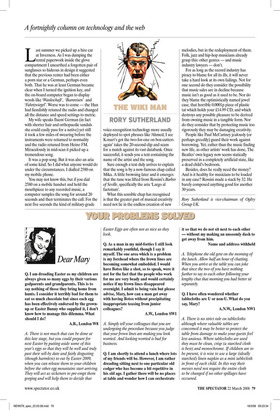A fortnightly column on technology and the web
Last summer we picked up a hire car at Inverness. As I was dumping the rental paperwork inside the glove compartment I unearthed a forgotten pair of sunglasses so hideous in design it suggested that the previous renter had been either a porn star or a German, perhaps even both. That he was at least German became clear when I turned the ignition key, and the on-board computer began to display words like ‘Wankschaft’, ‘Bumreisen’ and ‘Fahrtzwiegel’. Worse was to come — the Hun had fiendishly retuned the radio and changed all the distance and speed settings to metric.
My wife speaks fluent German (in fact with shorter hair and orthopaedic sandals she could easily pass for a native) yet still it took a few miles of swearing before the instruments were returned to normality and the radio retuned from Heino FM. Miraculously in mid-scan it picked up a tremendous song.
It was a pop song. But it was also an aria of some kind. So I did what anyone would do under the circumstances. I dialled 2580 on my mobile phone.
You may not know this, but if you dial 2580 on a mobile handset and hold the mouthpiece to any recorded music, a computer samples the song for around 20 seconds and then terminates the call. For the next five seconds the kind of military-grade voice-recognition technology more usually deployed to spot phrases like ‘Ahmed, I see K-mart’s got the two-for-one on box-cutters again’ takes the 20-second clip and scans for a match against its vast databank. Once successful, it sends you a text containing the name of the artist and the song.
Sure enough a text duly arrives to explain that the song is by a now-famous chap called Mika. A little browsing later and it emerges that the tune was lifted from Rossini’s Barber of Seville, specifically the aria ‘Largo al factotum’.
What this sensible chap has recognised is that the greater part of musical creativity need not lie in the endless creation of new melodies, but in the redeployment of them. Folk, jazz and hip-hop musicians already grasp this: other genres — and music industry lawyers — don’t.
For as long as the record industry has piracy to blame for all its ills, it will never take a hard look at its own failings. Not for one second do they consider the possibility that music sales are in decline because music isn’t as good as it used to be. Nor do they blame the optimistically named jewel case, that horrible 0.0001p piece of plastic tat which holds your £14.99 CD, and which destroys any possible pleasure to be derived from owning music in a tangible form. Nor do they consider that by protecting music too rigorously they may be damaging creativity.
People like Paul McCartney jealously (or perhaps greedily) guard their work against borrowing. Yet, rather than the music finding new life, as other artists’ work has done, The Beatles’ own legacy now seems statically preserved in a completely artificial state, like a dead child’s bedroom.
Besides, does he really need the money? And is it healthy for musicians to be loaded in any case? Rossini made a stack by 32. He barely composed anything good for another 30 years.


















































































 Previous page
Previous page